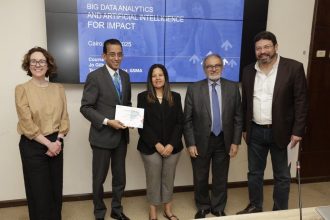In a significant advancement for medical technology in the region, a research team from Oman’s Sultan Qaboos University (SQU) has successfully developed an artificial intelligence model capable of detecting inherited cardiovascular diseases through electrocardiogram (ECG) analysis. This innovation represents a major step forward in the early and non-invasive diagnosis of conditions that can lead to sudden cardiac death.
A Non-Invasive Breakthrough in Cardiology
The core of the Omani team’s achievement is a sophisticated deep learning model designed to analyze 12-lead ECG images. Unlike traditional diagnostic methods that can be invasive or require extensive genetic sequencing, this AI-powered tool provides a rapid and accessible way to identify the “genetic fingerprint” of specific heart disorders. The system has demonstrated high accuracy in detecting hereditary conditions such as Brugada syndrome, Long QT syndrome, and hypertrophic cardiomyopathy, which are often silent killers, especially among young people.
The Science Behind the Model
The project was a collaborative effort between SQU’s College of Engineering and the College of Medicine and Health Sciences. The researchers meticulously created a unique and comprehensive dataset of ECG images, which was then used to train their AI model. By processing these images, the system learns to recognize subtle patterns and abnormalities that are indicative of specific genetic mutations linked to cardiovascular disease. This method effectively transforms a standard ECG from a simple heart rhythm test into a powerful predictive screening tool.
Significance for Public Health
The primary benefit of this technology is its potential for early detection. Many genetic heart disorders show no obvious symptoms until a life-threatening cardiac event occurs. By identifying at-risk individuals before symptoms manifest, clinicians can implement preventative strategies, including lifestyle changes, medication, or implantable devices. This Omani innovation could significantly reduce the incidence of sudden cardiac death and improve long-term health outcomes, not only in the Sultanate but potentially across the globe.
About the Research Team
The multidisciplinary research was spearheaded by Dr. Alya bint Khamis Al-Sabti from the College of Engineering. The team also included prominent experts Dr. Khalid bin Salem Al-Rasadi and Dr. Iman bint Al-Saleh from the College of Medicine and Health Sciences, alongside Engineer Al-Baraa bin Mohammed Al-Ismaili and Dr. Mohammed Al-Alawi. Their successful research has been published in a prestigious international scientific journal, validating its scientific rigor and global relevance.
Looking Ahead
While still in the research phase, the successful development of this AI model opens the door for future clinical trials and eventual integration into mainstream medical practice. The technology could become a standard part of cardiovascular screening, offering a cost-effective and efficient way to screen large populations. For the MENA region, where hereditary conditions can have a significant impact, this home-grown innovation from Oman highlights the growing potential of local talent to solve critical healthcare challenges through advanced technology.
Source: Zawya













